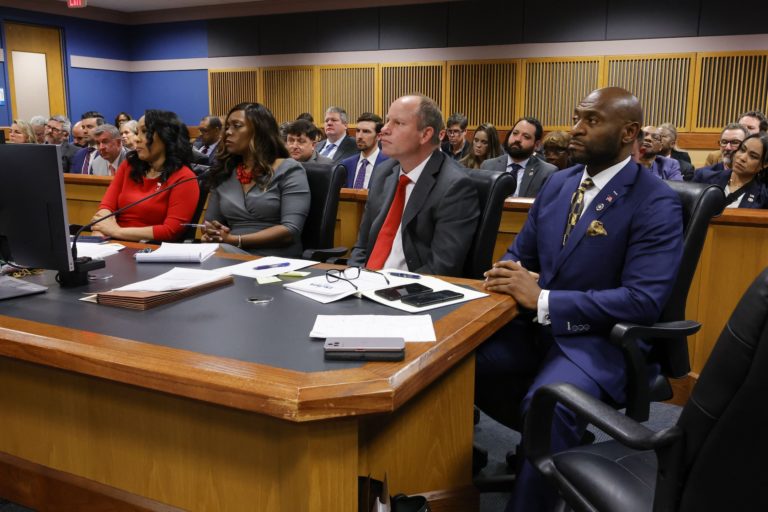District Attorney Fani Willis will stay on to lead Georgia’s election interference case against Donald Trump, but the top prosecutor, with whom she had a romantic relationship, is stepping aside. That departure came after the judge in the case said one of them would have to resign. William Brangham joins Amna Nawaz to catch up on a week of legal developments for the former president.
Read the Full Transcript
Notice: Transcripts are machine and human generated and lightly edited for accuracy. They may contain errors.
-
Amna Nawaz:
District attorney Fani Willis will continue to lead the Georgia election interference case against former President Donald Trump. But the top prosecutor, a man she had a romantic relationship with, is stepping aside. His resignation came after the judge said one of them had to go for the trial to move forward.
This development was just one of many this week in the multiple cases against the former president.
So, we turn again to our William Brangham, who's been covering them all.
William, good to see you.
-
William Brangham:
Great to see you.
-
Amna Nawaz:
So the judge in this case basically said to Fani Willis, OK, I'm not removing you, but your lead prosecutor cannot stay on.
Help us understand the judge's rationale here.
-
William Brangham:
The judge basically split this right down the middle.
This is not what Trump and his lawyers wanted. They wanted Fani Willis taken off the case and the whole case to be dismissed. That is not happening now.
McAfee, the judge, Scott McAfee, was very critical of Willis and her behavior. He wrote that romantic relationship between her and, remember, her handpicked prosecutor, Nathan Wade, created — quote — "the appearance of impropriety" and was a — quote — "tremendous lapse in judgment."
But he wrote that there was no apparent conflict of interest, which is what Trump and his allies had alleged. So, the judge said, Fani Willis, you and your entire team have to leave or Nathan Wade has to leave.
Wade left today, so the case will proceed. So this has definitely left an almost indelible ethical stain on her and her judgment and her office. But it doesn't really change the fundamental legal case that she's brought against Trump and his allies.
-
Amna Nawaz:
So Willis stays on.
But on those legal fundamentals, this is the same judge that earlier this week tossed out six of the charges that Willis had filed against Mr. Trump and his associates. What should we know about what happened there?
-
William Brangham:
Right.
Trump and his allies argued that there was some vagueness in some of the charges. Remember, this is the case about election interference in Georgia. And these charges involved allegations that Trump and his cohort were pressuring state elections officials to violate their constitutional oaths of office by basically making it so that Joe Biden did not win Georgia, when he, in fact, did.
The judge agreed that there was some of that vagueness, and he squashed six of those charges. That does leave 30 or something other charges that are part of this much vaster conspiracy indictment that she has brought against Trump and his allies, alleging this vast conspiracy to stop Georgia's votes going to Joe Biden.
So that case will go forward, but there is no trial date set for that yet.
-
Amna Nawaz:
OK, I want to ask you about another case. This is the so-called hush money case in New York involving Stormy Daniels. That was supposed to be the trial that went first. It's now been delayed another 30 days.
What should we understand about what's happening here?
-
William Brangham:
Yes, this one really was a bit of a surprise.
Just to recap, this is the case that was brought by the Manhattan district attorney, Alvin Bragg, alleging that Stormy Daniels, who is this former adult actress, was — she was going to bring a story to light back in 2016 during the campaign. Trump's fixer Michael Cohen paid her $130,000 to stay quiet about that.
That trial and that they — the allegation that they fudged their financial records to hide that payment, that was supposed to start a week from Monday, but now this 30-day delay. Why was that delay? It's suddenly because they are now receiving hundreds of thousands of pages of evidence from federal prosecutors in New York.
This was part of their 2018 case against Michael Cohen for financial crimes. So the main question here is, why is it that it took federal prosecutors all this time to give up this evidence to the Manhattan DA and to Donald Trump? Because they asked — they were asked for this evidence, I believe it was almost a year ago.
So, many former prosecutors are wondering what the hiccup was here. I talked to one very senior former Department of Justice official from New York. He was quite lacerating in his criticism, calling this an inexcusable lapse.
Now, with this delay, that trial probably won't start until the middle of April.
-
Amna Nawaz:
OK.
Meanwhile, down in Florida, another case there, that is the one involving former President Trump's handling of classified documents.
The Trump team this week tried to get that case thrown out. The judge dismissed that. What did she rule?
-
William Brangham:
This is Judge Aileen Cannon. This is the classified documents case that's alleging that Donald Trump basically held all of these classified documents, lied about them, and then obstructed justice in that investigation.
Trump and their team, they have been filing motions in all of their different cases. This is part of their strategy to push all of these trials off as long as possible, to delay them, push them even past the election. In this case, the judge ruled that one of their motions was inexcusable.
She said — I think it was — the term was that it's extraordinary, was the word she used. She did leave open the possibility that that motion could be brought back up during trial. But, for now, she seemed to express a great deal of skepticism towards Trump's arguments.
So this case is still a very, very long ways away, probably not going to happen before the November election.
-
Amna Nawaz:
William Brangham, thank you so much for staying on top of all of these trials and explaining it all. Appreciate it.
-
William Brangham:
My pleasure.






